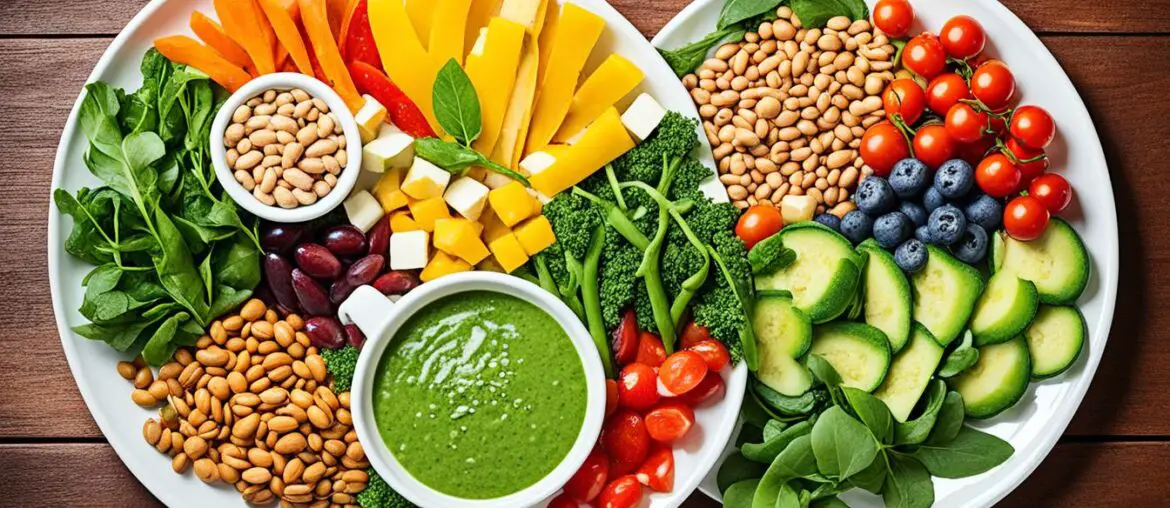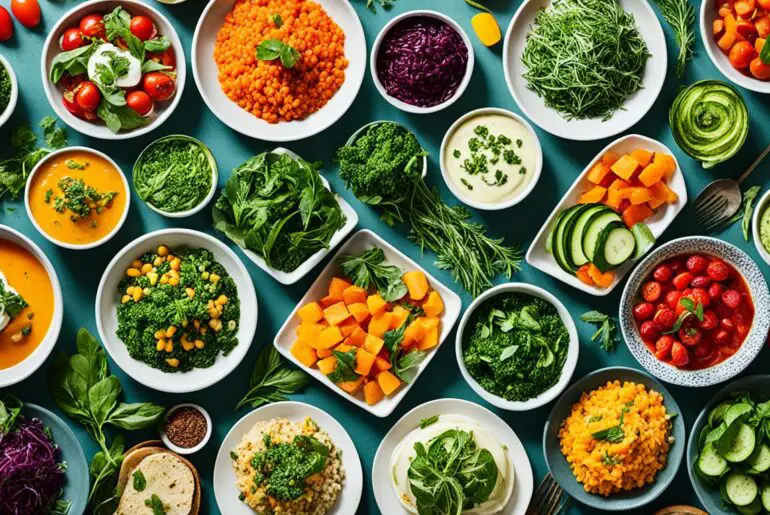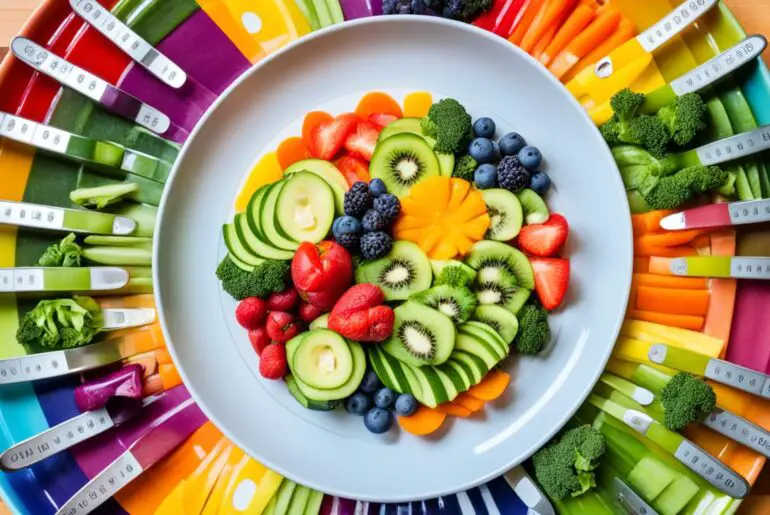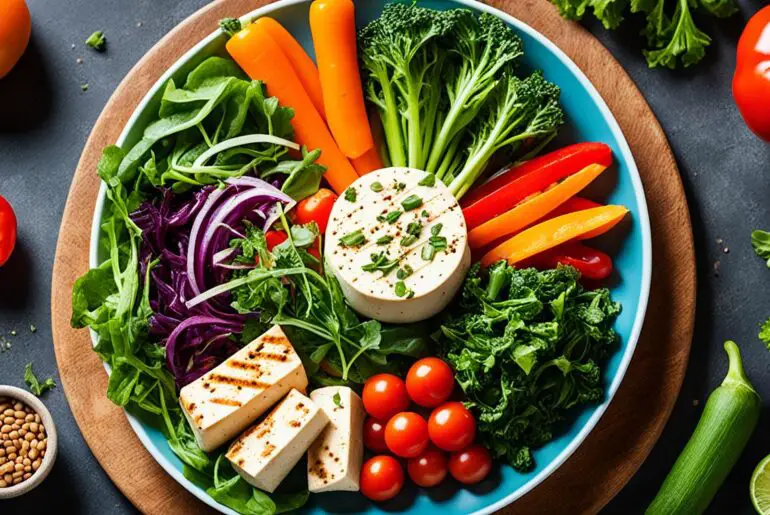Are you a vegetarian looking for an effective weight loss program? Have you considered the vegetarian HCG diet meal plan? Contrary to popular belief, following a plant-based HCG diet can lead to successful weight loss while adhering to your vegetarian lifestyle. But how does it work? And what are the key components of a healthy vegetarian HCG meal plan?
Key Takeaways:
- Discover how to achieve successful weight loss as a vegetarian on the HCG diet
- Understand the various types of vegetarian diets to determine your options for protein substitutes
- Explore protein sources like tofu, cottage cheese, legumes, and eggs for a well-balanced meal plan
- Learn about the different phases of the vegetarian HCG diet and the guidelines to follow in each phase
- Find out which beverages, seasonings, and additives are allowed on the vegetarian HCG diet
Types of Vegetarian Diets
When it comes to vegetarian diets, there are different types that individuals can choose based on their dietary preferences and restrictions. Each type has its own set of rules and restrictions regarding the consumption of animal products. Let’s explore the three main types of vegetarian diets: vegan, lacto-vegetarian, and lacto-ovo vegetarian.
Vegan Diet
A vegan diet is the most restrictive type of vegetarian diet. Vegans avoid the consumption of all animal products, including not only meat and fish but also dairy, eggs, and any other products derived from animals. Instead, they rely solely on plant-based foods for their nutrition.
“The vegan diet is a plant-based eating pattern that excludes all animal products, making it a compassionate and environmentally-friendly choice.”
Lacto-vegetarian Diet
A lacto-vegetarian diet includes dairy products in addition to plant-based foods. Individuals following a lacto-vegetarian diet avoid meat, fish, eggs, and any other animal products, but they do consume dairy products such as milk, cheese, and yogurt.
Lacto-ovo Vegetarian Diet
The lacto-ovo vegetarian diet is the most lenient type of vegetarian diet. People following this diet consume both dairy products and eggs, in addition to plant-based foods. They exclude meat, fish, and poultry from their diet but include dairy products and eggs as sources of protein and nutrients.
When it comes to the vegetarian HCG diet, the specific type of vegetarian diet you follow will determine the protein options available to you. It’s important to choose protein substitutes that align with your specific dietary restrictions while still providing the necessary nutrients for maintaining a healthy diet.
Protein Substitutes for Vegetarians on the HCG Diet
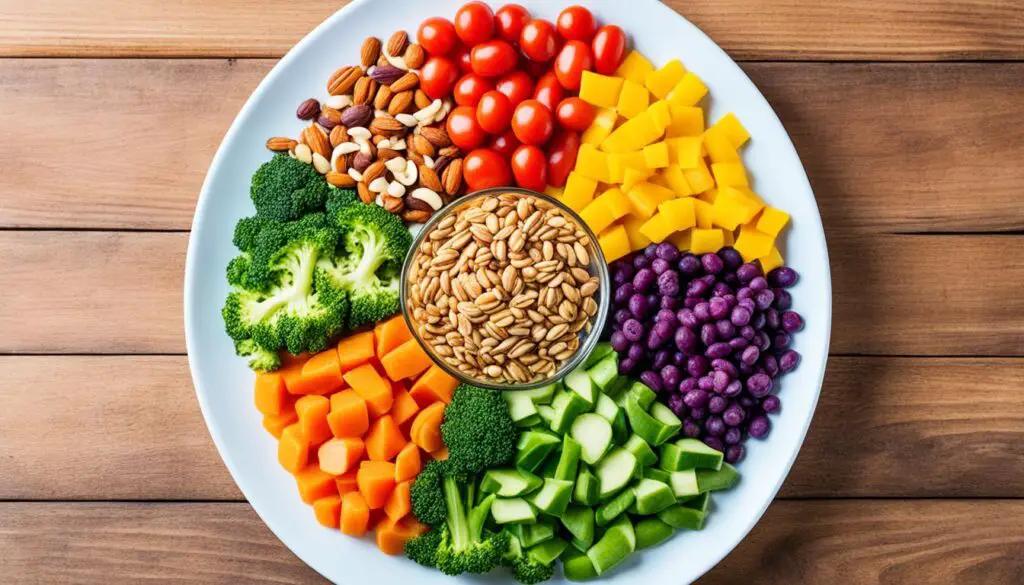
On the HCG diet, vegetarians have a variety of protein substitutes to choose from to ensure they meet their nutritional needs. Incorporating these options into their meal plans can help vegetarians maintain a balanced and protein-rich diet. Here are some protein substitutes that vegetarians can consider:
Tofu
Tofu is a versatile plant-based protein made from soybeans and has approximately 20g of protein per cup. It can be cooked in various ways, making it a popular choice among vegetarians. Whether grilled, stir-fried, or added to soups and salads, tofu is an excellent source of protein for vegetarians on the HCG diet.
Cottage Cheese
Cottage cheese provides around 30g of protein per cup, making it a valuable addition to a vegetarian HCG diet. It can be enjoyed on its own or mixed with protein powder to increase protein intake. Adding cottage cheese to salads or using it as a healthy dip for vegetables can add a protein boost to meals.
Legumes
Legumes such as soy and pea protein are rich sources of plant-based protein. These legumes can be consumed in various forms, including tofu, tempeh, and soy-based products, which offer a range of protein options for vegetarians on the HCG diet. Pea protein powders are also available as a convenient protein supplement.
Eggs
Eggs are allowed on the HCG diet and can be consumed as a protein substitute by vegetarians. They are versatile and can be prepared in different ways, such as scrambled, boiled, or turned into omelets. Eggs provide essential amino acids and are an excellent source of high-quality protein for vegetarians on the HCG diet.
By incorporating these vegetarian protein substitutes into their meals, vegetarians can ensure they meet their protein requirements while following the HCG diet.
| Protein Substitute | Protein Content (per cup) |
|---|---|
| Tofu | Approximately 20g |
| Cottage Cheese | Approximately 30g |
| Legumes (Soy and Pea Protein) | Varies depending on the form |
| Eggs | Varies depending on size |
These protein substitutes provide a range of options for vegetarians on the HCG diet, ensuring that they have ample protein sources to support their overall health and weight loss goals.
Vegetarian HCG Diet Meal Plan Phases
The vegetarian HCG diet follows three main phases to ensure successful weight loss and maintenance. These phases are the loading phase, the weight loss phase, and the maintenance phase.
Loading Phase
The loading phase of the vegetarian HCG diet is essential in building up fat stores before starting the low-calorie phase. It lasts for 48 hours and involves consuming high-calorie foods. During this phase, it is important to focus on healthy fats and avoid processed and sugary foods. This phase helps prepare the body for the calorie restriction that follows in the weight loss phase.
Weight Loss Phase
The weight loss phase is the core phase of the vegetarian HCG diet. It typically lasts for three to six weeks, depending on individual goals and progress. During this phase, a low-calorie diet is followed, typically ranging from 500 to 800 calories per day. The diet plan includes specific vegetarian food choices that provide adequate nutrition while promoting weight loss. This phase requires discipline and adherence to the meal plan to achieve optimal results.
Maintenance Phase
After successfully completing the weight loss phase, the maintenance phase begins. This phase focuses on stabilizing weight loss and reintroducing certain food options back into the diet. Vegetarians have some flexibility during this phase and can include legumes and organic dairy products. However, it is essential to continue making healthy choices and maintain a balanced diet to sustain the weight loss achieved during the program.
The vegetarian HCG diet phases are designed to support individuals in achieving their weight loss goals while ensuring proper nutrition and long-term sustainability. By following each phase diligently, vegetarians can experience successful weight loss and maintain a healthier lifestyle.
| Phase | Duration | Main Focus |
|---|---|---|
| Loading Phase | 48 hours | Build up fat stores |
| Weight Loss Phase | 3 to 6 weeks | Calorie restriction and weight loss |
| Maintenance Phase | Ongoing | Stabilize weight loss and reintroduce food options |
Vegetarian HCG Diet Meal Plan Guidelines
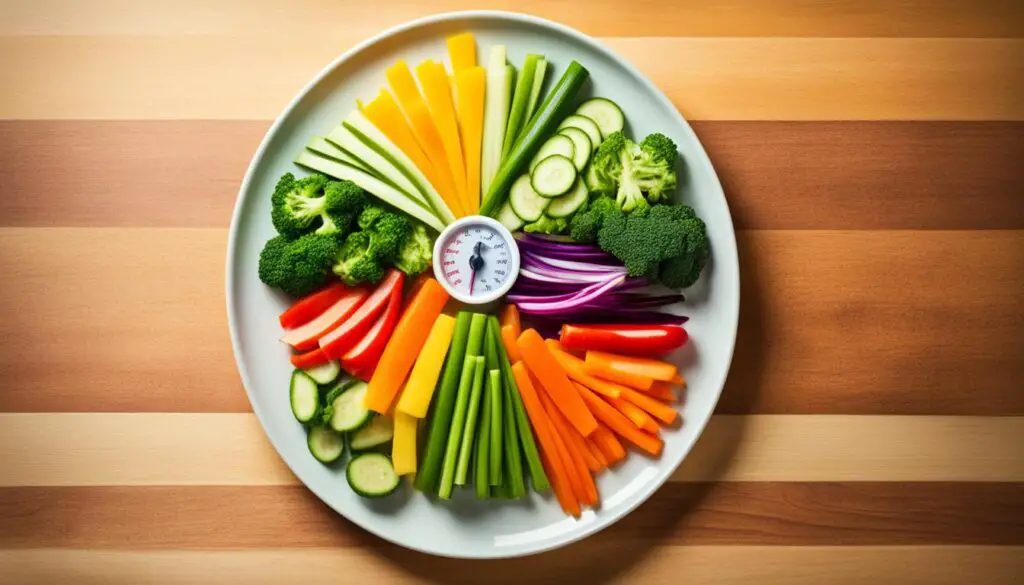
When following the vegetarian HCG diet, it is important to adhere to specific guidelines to ensure optimal results. Here are some guidelines to keep in mind:
Breakfast Options
For breakfast, you have a few options to choose from. You can enjoy a cup of tea or coffee, adding a tablespoon of milk. This will provide a flavorful start to your day while keeping your calorie intake in check.
Protein Servings
Protein is an essential component of the vegetarian HCG diet. To meet your protein requirements, you can choose from protein powder, cottage cheese, tofu, or eggs. These options are rich in protein and will help you stay satisfied throughout the day.
Vegetable Servings
When it comes to vegetables, it is recommended to consume them either raw or cooked without mixing different types. This will allow you to enjoy the nutritional benefits of each vegetable individually, ensuring a varied and balanced diet.
Fruit Servings
Fruits are a delicious and nutritious addition to your vegetarian HCG diet. You can have two servings of fruits per day, either as a snack or as part of a meal. Choose a variety of fruits to get a range of vitamins and minerals.
Water Intake
Staying hydrated is crucial for any diet, including the vegetarian HCG diet. It is recommended to drink plenty of water throughout the day. Aim for at least eight 8-ounce glasses (64 ounces) of water daily. Hydration will help you feel full and support your weight loss efforts.
By following these guidelines and incorporating these breakfast options, protein servings, vegetable servings, fruit servings, and maintaining proper water intake, you are setting yourself up for success on the vegetarian HCG diet.
| Meal Component | Options |
|---|---|
| Breakfast | Tea or coffee with a tablespoon of milk |
| Protein Servings | Protein powder, cottage cheese, tofu, or eggs |
| Vegetable Servings | Raw or cooked without mixing different types |
| Fruit Servings | Two servings of fruits per day |
| Water Intake | Drink at least eight 8-ounce glasses (64 ounces) of water daily |
Beverage Options on the Vegetarian HCG Diet
When following the Vegetarian HCG Diet, choosing the right beverages is an essential part of the plan. It is important to stay hydrated and make smart choices that support your weight loss goals. Let’s explore the beverage options available on the Vegetarian HCG Diet.
Tea
Tea is a fantastic beverage choice on the Vegetarian HCG Diet. Whether you prefer green tea, black tea, or herbal teas, you can enjoy them all. Tea not only provides a comforting and soothing experience but also offers various health benefits. It is rich in antioxidants and can help boost metabolism, aid digestion, and support overall well-being.
Coffee
Coffee lovers, rejoice! You can still enjoy your favorite cup of joe while following the Vegetarian HCG Diet. However, it is essential to consume it in moderation. Stick to black coffee or add a tablespoon of milk to minimize calorie intake. Coffee can provide an energy boost, increase focus, and even enhance athletic performance.
Water Intake
Water is a crucial component of any diet plan, including the Vegetarian HCG Diet. It is recommended to drink at least 75 ounces (2.2 liters) of water per day to stay hydrated and support weight loss. Water helps flush out toxins, suppresses appetite, and keeps your body functioning optimally. Remember to spread your water intake throughout the day and make it a priority.
Other Beverage Options
In addition to tea, coffee, and water, you can enjoy other beverages that align with the Vegetarian HCG Diet guidelines. Mineral water, with its refreshing bubbles, can be a great alternative to regular water. Herbal teas, such as chamomile or peppermint, can provide a soothing and calming effect after a long day. Just make sure to choose herbal teas without added sugars or artificial sweeteners.
To summarize, the Vegetarian HCG Diet offers a range of beverage options to keep you hydrated and satisfied. Tea, coffee, and water should be the mainstays of your daily routine, consumed in any quantity throughout the day. Don’t forget to listen to your body’s thirst cues and prioritize staying adequately hydrated. Cheers to your health and weight loss success!
| Beverage Options | Benefits |
|---|---|
| Tea | – Rich in antioxidants – Supports metabolism – Aids digestion |
| Coffee | – Provides an energy boost – Enhances focus – Helps athletic performance |
| Water | – Essential for hydration – Flushes out toxins – Suppresses appetite |
| Mineral Water | – Refreshing alternative to water |
| Herbal Teas | – Soothing and calming effect |
Note: Always consult with a healthcare professional before starting any diet plan or making significant changes to your current diet.
Seasonings and Additives for the Vegetarian HCG Diet
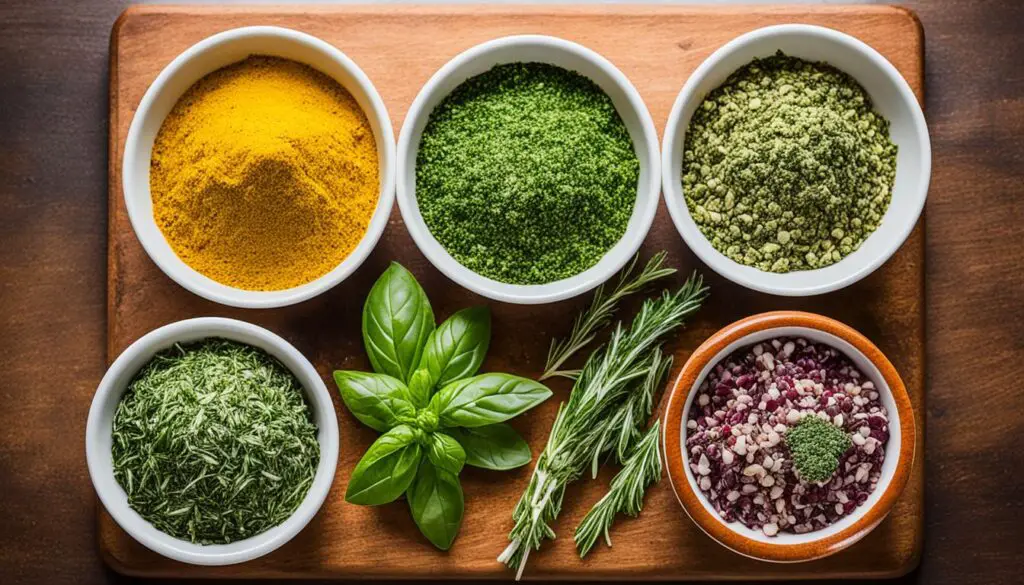
One of the key aspects of the Vegetarian HCG Diet is finding ways to enhance the flavor of meals while still adhering to the diet’s guidelines. Thankfully, there are various seasonings and additives that are approved for use. These additions can help bring new and exciting flavors to your vegetarian HCG meals. Here are some of the approved options:
- Lemon juice: A tangy and refreshing addition to salads and cooked vegetables.
- Garlic: Adds a flavorful kick to sautéed vegetables and homemade sauces.
- Thyme: A versatile herb that pairs well with roasted vegetables and grilled tofu.
- Vinegar: Offers a tangy note to dressings and marinades for your vegetarian protein substitutes.
- Sea salt: Enhances the natural flavors of ingredients without adding unnecessary calories.
- Basil: Perfect for adding an aromatic touch to pasta dishes or vegetable stir-fries.
- Pepper: Adds a subtle heat and depth of flavor to your vegetarian HCG meals.
- Low-calorie salad dressings: Choose dressings that are specifically designed for low-calorie diets to add variety to your salads.
When selecting seasonings and additives, it is important to opt for options that have minimal sugar and fat content. This ensures that you stay within the HCG diet’s guidelines and make healthy choices. Be mindful of portion sizes and use these seasonings and additives to enhance the natural flavors of your vegetarian HCG meals without overpowering them. Experiment with different combinations to find your favorite flavor profiles.
Discovering the right seasonings and additives will add depth and excitement to your Vegetarian HCG Diet meals. However, it is important to exercise moderation and choose options that align with the diet’s guidelines. By incorporating these approved condiments, you can enjoy flavorful, satisfying meals throughout your vegetarian HCG journey.
Protein Powders and Dairy Options for the Vegetarian HCG Diet
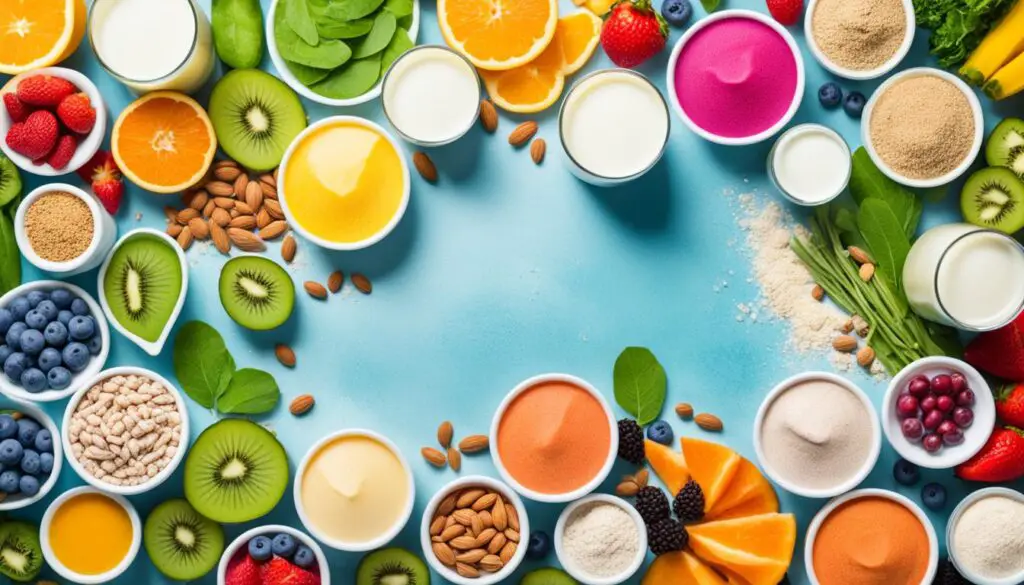
When following the Vegetarian HCG Diet, finding suitable protein sources and dairy alternatives is essential for meeting nutritional needs. Fortunately, there are several options available to vegetarians that can help fulfill protein requirements and provide dairy alternatives.
Protein Powders
To supplement protein intake, vegetarians following the HCG diet can choose from a variety of protein powders. Some popular options include:
- Rice protein powder: A plant-based protein powder that is easily digestible and suitable for vegetarians.
- Natural whey powder: While not suitable for vegans, natural whey powder is a good option for lacto-vegetarians.
- Vegan protein powders: These protein powders are made from plant-based sources such as peas, hemp, or brown rice.
When selecting protein powders for the Vegetarian HCG Diet, it is important to choose products with low carbohydrate content and those that are sweetened only with natural, sugar-free options like stevia or xylitol. Reading labels and choosing clean, low-carb products is essential for maintaining the diet’s guidelines.
Dairy Options
For vegetarians who consume dairy products, there are alternatives available that can be incorporated into the Vegetarian HCG Diet. Some options include:
- Vegan cottage cheese: Made from plant-based ingredients, vegan cottage cheese is a great substitute for traditional cottage cheese.
- Eggs: Eggs are allowed on the HCG diet and can be consumed as a source of protein for vegetarians.
- Vegetarian cheese: There are various vegetarian cheeses made without animal rennet, which can be used as a dairy alternative.
When choosing dairy options, it is important to ensure they are free from any animal by-products and adhere to the guidelines of the Vegetarian HCG Diet.
The image below showcases some protein powder options and dairy alternatives suitable for vegetarians on the HCG diet:
Vegetarian Protein Sources for the HCG Diet
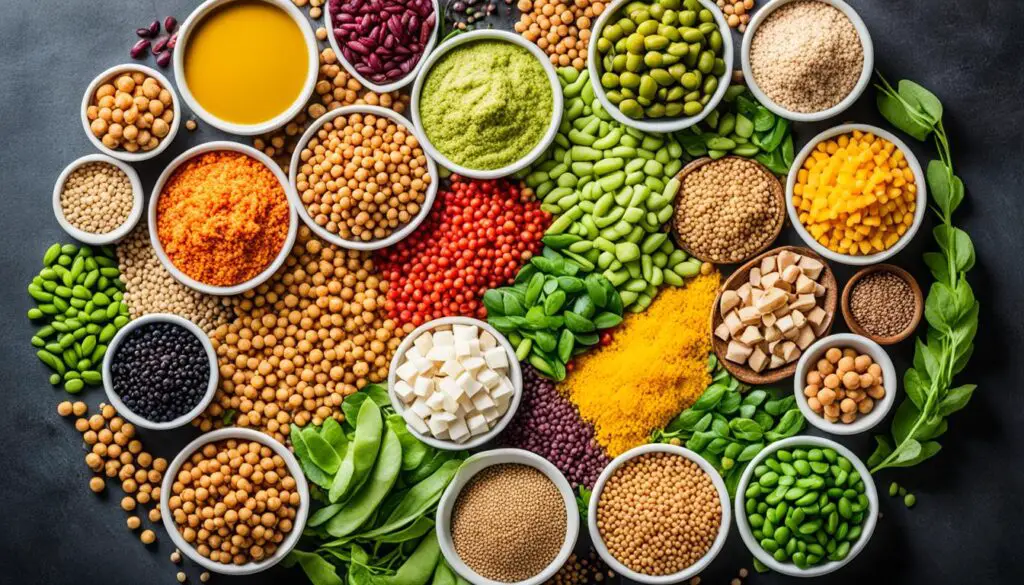
When following the HCG diet as a vegetarian, it’s essential to incorporate protein-rich foods into your meals. Fortunately, there are plenty of vegetarian protein sources that can keep you on track with your diet goals. From soy products to beans, seeds, and superfoods, here are some excellent options to consider:
- Soy Products: Soy products like tofu, tempeh, and miso soup are high in protein and can provide a substantial amount of essential amino acids. These versatile soy-based foods can be incorporated into various recipes to add flavor and texture while ensuring you meet your protein needs.
- Beans: Beans, such as kidney beans and black beans, are not only a good source of fiber but also offer a significant amount of protein. These legumes can be used in salads, soups, or as a base for vegetarian burgers, providing a filling and nutritious protein option.
- Seeds: Flax seeds and sesame seeds are small, but they pack a protein punch. Incorporating these seeds into your meals, such as sprinkling them on salads, adding them to smoothies, or using them as toppings for roasted vegetables, can help increase your protein intake.
- Superfoods: Superfoods like hemp hearts and spirulina powder are excellent options to boost protein intake. Hemp hearts can be sprinkled on yogurt or added to baked goods, while spirulina powder can be blended into smoothies or mixed with water for a nutrient-dense protein shake.
Incorporating these vegetarian protein sources into your HCG diet can help ensure you’re meeting your nutritional needs while maintaining the desired calorie intake. Experiment with different recipes and meal combinations to add variety and flavor to your vegetarian HCG diet plan.
Vegetarian HCG Diet for Weight Loss Success

The vegetarian HCG diet is a promising weight loss solution when followed correctly. By adhering to the meal plan guidelines and incorporating protein substitutes, vegetarians can achieve their weight loss goals effectively. While individual results may vary, the diet has shown significant success for many people seeking sustainable weight loss.
Adherence to Meal Plan Guidelines
Following the meal plan guidelines is crucial for the success of the vegetarian HCG diet. By carefully selecting the right protein substitutes, incorporating appropriate vegetables and fruits, and monitoring portion sizes, individuals can optimize their weight loss journey. Consistency and discipline in adhering to the recommended food choices and meal timings are key to achieving desired results.
Incorporating Protein Substitutes
Protein substitutes play a vital role in the vegetarian HCG diet. By incorporating sources such as tofu, cottage cheese, legumes, and eggs, vegetarians can maintain adequate protein intake while keeping calorie consumption low. These protein substitutes not only provide essential nutrients but also help in preserving muscle mass during weight loss, ensuring a healthy and sustainable approach to shedding pounds.
“Protein substitutes are crucial for vegetarians on the HCG diet, as they provide necessary nutrients and help maintain muscle mass during weight loss.”
Sustainable Weight Loss
The vegetarian HCG diet focuses on sustainable weight loss by emphasizing healthy food choices and portion control. By promoting a balanced approach to eating and incorporating nutrient-rich foods, this diet encourages lifelong habits that can contribute to weight maintenance in the long run. With the right mindset and commitment, individuals can achieve their weight loss goals and sustain their overall well-being.
Real-Life Success Stories
Many individuals have experienced remarkable weight loss success following the vegetarian HCG diet. They have not only achieved their desired weight loss but also observed improvements in their overall health and well-being. These success stories serve as inspiration and motivation for others embarking on their own weight loss journey.
The vegetarian HCG diet offers a promising opportunity for individuals seeking sustainable weight loss results. By adhering to the meal plan guidelines, incorporating protein substitutes, and maintaining a positive mindset, vegetarians can achieve their weight loss goals effectively. With the right approach and commitment, the vegetarian HCG diet can be a successful strategy for those looking to transform their bodies and embrace a healthier lifestyle.
Conclusion
The Vegetarian HCG Diet offers a tailored weight loss solution for individuals who follow a vegetarian lifestyle. With proper protein substitutes and adherence to the diet guidelines, vegetarians can successfully achieve weight loss. Following a personalized weight loss journey is crucial to ensure the diet fits your specific needs and health goals.
When embarking on any weight loss program, including vegetarian weight loss programs, it’s essential to seek guidance from a healthcare provider or weight loss specialist. They can provide personalized advice, monitor your progress, and address any concerns or challenges that may arise.
The Vegetarian HCG Diet is a comprehensive approach that promotes a healthy lifestyle and sustainable weight loss. By incorporating suitable protein substitutes, following the recommended meal plan, and consulting with professionals, vegetarians can make significant progress towards achieving their weight loss goals. Remember, everyone’s weight loss journey is unique, so finding the right program that suits your personal preferences and needs is key for long-term success.
FAQ
What is the Vegetarian HCG Diet Meal Plan?
The Vegetarian HCG Diet Meal Plan is a weight loss program designed for individuals who follow a vegetarian lifestyle. It is a modified version of the traditional HCG diet, which involves a low-calorie intake and hormone injections.
What are the types of Vegetarian Diets?
There are different types of vegetarian diets, including vegan (avoiding all animal products), lacto-vegetarian (consuming dairy but avoiding other animal products), and lacto-ovo vegetarian (including both dairy and eggs in the diet).
What are the protein substitutes for vegetarians on the HCG diet?
Vegetarians can choose from several protein substitutes on the HCG diet, including tofu, cottage cheese, legumes (such as soy and pea protein), and eggs.
What are the phases of the Vegetarian HCG Diet Meal Plan?
The Vegetarian HCG Diet Meal Plan consists of three main phases: the loading phase (48 hours of consuming high-calorie foods), the weight loss phase (three to six weeks of following a low-calorie diet), and the maintenance phase (where weight loss stabilizes and certain food options are reintroduced).
What are the guidelines for the Vegetarian HCG Diet Meal Plan?
The Vegetarian HCG Diet Meal Plan guidelines include having tea or coffee with a tablespoon of milk for breakfast, consuming protein servings from options like protein powder, cottage cheese, tofu, or eggs, and having raw or cooked vegetables without mixing different types.
What beverage options are allowed on the Vegetarian HCG Diet?
The Vegetarian HCG Diet allows for tea, coffee, and water to be consumed in any quantity throughout the day. It is recommended to drink at least 75 ounces of water per day for hydration and weight loss.
What seasonings and additives are allowed on the Vegetarian HCG Diet?
Approved seasonings and additives on the Vegetarian HCG Diet include lemon juice, garlic, thyme, vinegar, sea salt, basil, pepper, and low-calorie salad dressings. It is important to choose condiments and additives with minimal sugar and fat content.
What protein powders and dairy options are suitable for the Vegetarian HCG Diet?
Vegetarians on the HCG diet can choose from protein powders such as rice protein powder, natural whey powder, and vegan protein powders. Dairy options include vegan cottage cheese, eggs, and vegetarian cheese. It is important to choose clean, low-carb products.
What are some vegetarian protein sources for the HCG diet?
Vegetarians can obtain protein from soy products like tofu, tempeh, and miso soup. Beans such as kidney beans and black beans, and seeds like flax seeds and sesame seeds are also good sources. Superfoods like hemp hearts and spirulina powder can also be added to meals for increased protein intake.
Can the Vegetarian HCG Diet lead to successful weight loss?
Yes, when followed correctly, the Vegetarian HCG Diet can lead to successful weight loss. By adhering to the meal plan guidelines and incorporating protein substitutes, vegetarians can achieve their weight loss goals. However, results may vary for each individual.
How can the Vegetarian HCG Diet be personalized for my weight loss journey?
It is important to consult with a healthcare provider or weight loss specialist for personalized guidance and support throughout the Vegetarian HCG Diet. They can help tailor the diet to your specific needs and provide ongoing assistance for a successful weight loss journey.

